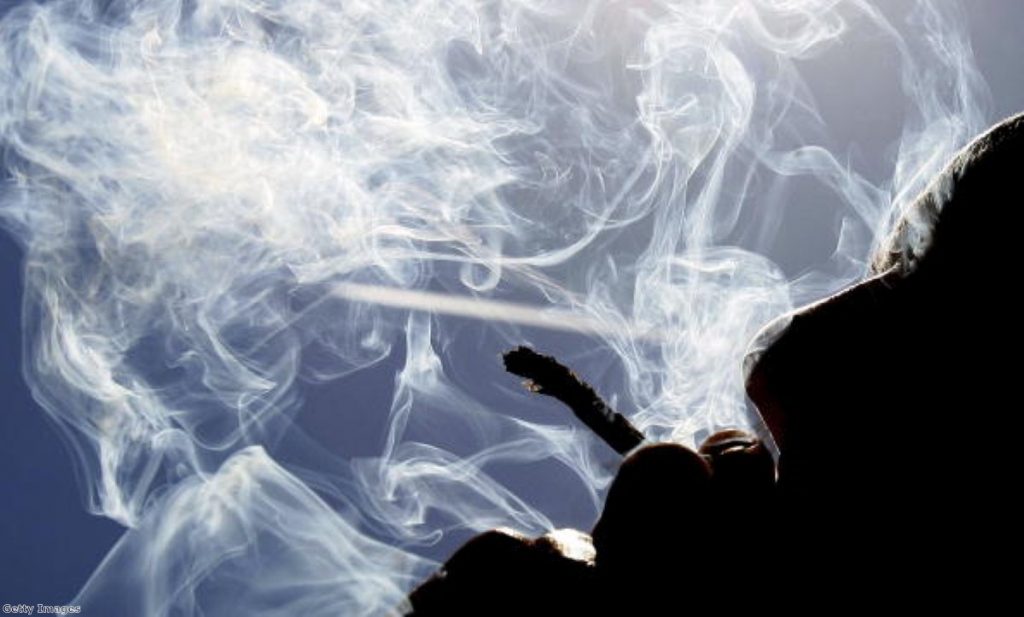What media reports on the new cannabis study don’t tell you
Reefer madness is upon us again, with media reports on a new cannabis study suggesting that a couple of puffs on a joint will inevitably lead young people to psychosis.
It's nonsense. While it's true that the study shows skunk to be dangerous, it also found milder forms of cannabis, like hash, to be completely harmless. These findings do not disprove the case for drug law reform: they make it.
The study – by Robin Murray and Marta di Forti from the Institute of Psychiatry, Psychology & Neuroscience at King's College London, and published in the journal Lancet Psychiatry – took data from 410 patients who'd suffered a first episode of psychosis and 370 people in a control group, all in south London.
The headline finding has been enthusiastically reported by the mainstream press. "Super strong cannabis responsible for quarter of new psychosis cases," the Telegraph said. "Scientists show cannabis TRIPLES psychosis risk," the Mail said, adding that "groundbreaking research blames 'skunk' for 1 in 4 of all new serious mental disorders".
The researchers did find a connection between skunk use and the likelihood of a psychotic episode, but crucially this was for those who started using the drug very young and did so very regularly.
The study specifically did not show that cannabis use triggered psychosis. In fact, it showed the opposite. Plenty of people in the control group had smoked cannabis and not had a psychotic episode. In fact, patients who had suffered psychosis were no more likely than the control group to have tried cannabis.
As the authors found:
"Individuals who had ever used cannabis were not at increased risk of psychotic disorder compared with those who had never used cannabis."
Furthermore, those who smoked hash, a milder form of cannabis than skunk, suffered no ill-effects to their mental health. The study concluded:
"Individuals who mostly used low potency (hash-like) cannabis occasionally, at weekends, or daily had no increased likelihood of psychotic disorders compared with those who never used cannabis."
The lack of risk from non-skunk cannabis use is underlined by the fact that so many people in the control group had used the drug before. This being south London, "the proportion of controls with a history of cannabis use (63%) was more than the national average (40%) for similar age groups".

Skunk, pictured here, is far stronger than other varieties of cannabis
However, it is clear that skunk is much more dangerous than other forms of cannabis. More research is needed, but this is probably a result of the fact skunk contains more THC and virtually no cannabidiol, which seems to ameliorate the psychotogenic effect.
As the authors found:
"The presence of cannabidiol might explain our results, which showed that hash users do not have any increase in risk of psychotic disorders compared with non-users, irrespective of their frequency of use."
The authors even toy with the idea that skunk may be so common among those who have had a first psychotic episode because they started smoking cannabis – through weed or hash – to ameliorate their symptoms. Then they upgraded to skunk, thinking it would combat anxiety even more effectively, only to find that this stronger type doubled down on the psychological effects without any of the cannabidiol to calm it down.
Regardless of the details, the mainstream press went into its usual frenzy. And the anti-drugs lobby seized on it.
Mark Winstanley, CEO of Rethink Mental Illness, said:
"People often think of cannabis as a safe or harmless drug, but this study clearly shows that smoking 'skunk' greatly increases your chances of developing serious mental health problems. Reclassifying cannabis isn't the answer. Essentially, smoking cannabis is like playing a very real game of Russian roulette with your mental health."

Skunk did seem to play a causal role in some patients who had had a first psychiatric episode
Edward Boyd, deputy policy director of the Centre for Social Justice, the think-tank founded by Iain Duncan Smith, said:
"This study provides yet more evidence that liberalising drugs laws is not the way to go. It will only lead to more people suffering from the misery of drug addiction, which, as this study shows, could well include psychosis."
Actually, the paper does the precise opposite. It makes the case for legalising cannabis much more compelling. It's by regulating the market for a drug that you can prevent harm. And in this case, there is a very clear way to do that – encourage the use of milder varieties which have been shown to be harmless.
As Danny Kushlick of Transform says:
"Skunk is a product of prohibition itself. The iron law of prohibition is that it will produce the most potent variety, just like crack in the cocaine market. It's pure economics. The economics of a deregulated market determines that the most potent, high yield, highest profit version will dominate. And that's what skunk is.
"In a legally regulated market that's not the case and you have a variety. Currently, cannabis is like a market where you go into the pub and all they've got on tap is absinthe. It's ludicrous. What you want are low-alcohol beers and wines and other things. Where people have a choice they graduate towards milder versions."
The media reports have focused on the damage skunk does. But they could just as easily have focused on the fact it found hash does no damage whatsoever. Similarly, the idea the study contradicts the case for reform is misguided in the extreme. It is a regulated market which would protect young people from the dangers of drugs.





-01.png)